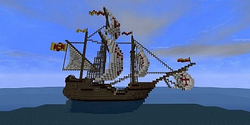Copy of `Ship Modelling - Model ship terms`
The wordlist doesn't exist anymore, or, the website doesn't exist anymore. On this page you can find a copy of the original information. The information may have been taken offline because it is outdated.
|
|
|
Ship Modelling - Model ship terms
Category: Hobbies and Crafts > Shipmaking
Date & country: 10/09/2014, USA
Words: 20
|
WingsExtensions to either side of the ship. Specifically, the port and starboard wings of the bridge are open areas to either side of the bridge, Used by lookouts and for Signaling.
SteerageOriginally the junior officers' quarters in a naval vessel, referring to the fact that the ship's tiller often projected into the compartment, located far aft. In the 19th century, the term came to mean the cheapest passenger quarters aboard a liner, again, often near the ship's stern where the noise of the ship's screws and engines was unrelenting,
StewardA general term for any member of a ship's crew involved with Commissary duties or personal services to passengers and/or crew. The term comes from an old Anglo-Saxon term
Weather DeckAny deck on a ship open and exposed to the... well, weather.
StateroomAn officer's or passenger's cabin aboard a merchant ship, or the cabin of an officer other than the captain aboard a naval ship, The term may be derived from the fact that in the 16th and 17th centuries, ships often had a cabin reserved for royal or noble passengers.
StarboardThe right side of the ship when facing forward. The name is a very old one, derived from the Anglo-Saxon term Steorbord, or Steering-board, Ancient vessels were steered not by a rudder amidships, but by a long oar or Steering-board extended over the vessel's right side aft. This became known, in time, as the Steering-board side or starboard.
StackThe ship's funnel on an engine-powered vessel. The origin is probably naval slang,
Poop DeckThe aft-most, raised weather deck on a ship. The name came from the Middle English poupe, from the Latin puppim, meaning the rear section of a ship The word derived from the Latin Puppis, meaning a doll or small image, The Romans and other ancient seafaring peoples had a small sacred idol or image affixed to the stern, where the deity it represented could watch over the vessel. To be pooped incidentally, meant to have a wave break over the ship's stern.
Side BoysSome officers of the admiralty, particularly those of higher rank, would attain considerable body weight in their later years. This made coming aboard a ship a particularly strenuous activity. So, the side boys had the job of hauling the short-o-breath officer inboard if he had difficulties.
MessPart of the ship's company that eats together, (such as the officers' mess) and, by extension, the place where they eat. On passenger liners, the passengers may still eat in dining rooms, but the crew eats in the mess. from late Latin missum, that which is put on a table.
OfficerA definition is scarcely necessary, and it's derivation from the Old French official is obvious. They've been with us a long time, though. The word originally comes from the Late Latin officarius.
GrogAdmiral Vernon (1684-1757) wore his cloak of grogram (silk and wool mix) so habitually that his men nicknamed him
Head(1) The uppermost or forward-most part of a ship (or Of some specific part of a ship, such as the masthead, beakhead, stemhead, or whatever. (2) The bathroom. In the age of sail, the crew was quartered forward in the forecastle, and their latrine was located on the beakhead, over hanging the water (for obvious reasons).
LandmenUnskilled seamen. Did all of the heavy work onboard ship. Made up the majority of ship's company. Also known as 'Waisters', those who worked in the waist area of the ship. They never worked aloft, like the able bodied seamen.
Brass PounderAn early 20th-century term for the ship's radio operator, from the brass key of his transmitter,
BulwarkA solid rail or wall extending the ships sides above the deck. From Old English and Norse, but of unknown meaning.
FallThe line on any tackle that is hauled. The tackles on boat davits are known as boat falls, from the Middle English fallen, meaning a fall.
Black GangThe engineering crew aboard ship. The term arose in the 19th century and referred then to the boiler-room crew in early coal-burning steamships. The derivation is obvious.
BinnacleThe stand on which the ship's compass is mounted. Before the 18th century, the word was bittacle, which came from the French habitacle and the Latin habitaculum, meaning a place of habitation. Before compasses came into use, it referred to a lantern stand.
Beak headOriginally the ram on the prow of a fighting galley. Later, it referred to a small, far-forward, pointed platform. Probably from an old Celtic or Gaulish word bec of beq.

